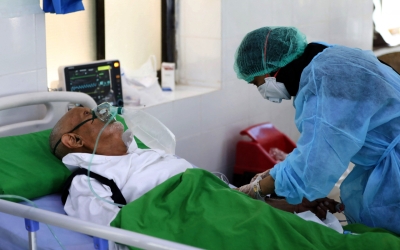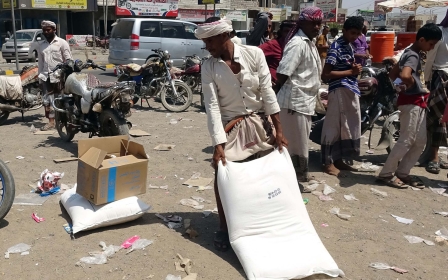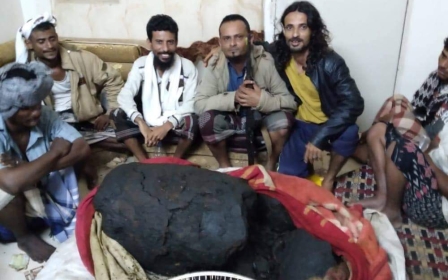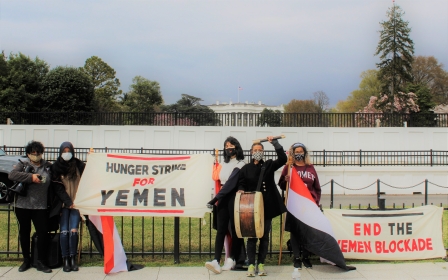Yemen: Covid-19 vaccine misinformation feeds unease as first jabs arrive
Deaths and infections from Covid-19 in Yemen, one of the world's poorest countries, are surging.
So much so that Yemen’s Supreme National Emergency Committee for Covid-19, a body linked to the country’s internationally recognised government, recently urged authorities to declare a public health "state of emergency".
The committee said on Thursday that there have been more than 5,000 cases and 1,000 deaths since the outbreak of the virus last year, but the real figure is likely to be much higher.
Yemen's six-year war has restricted testing and reporting, with the Houthis, who control most large urban centres, having provided no figures since an initial few last May.
Yemen received its first 360,000 doses of the AstraZeneca Covid-19 vaccine in late March from Covax, a global scheme to provide jabs to countries in need.
New MEE newsletter: Jerusalem Dispatch
Sign up to get the latest insights and analysis on Israel-Palestine, alongside Turkey Unpacked and other MEE newsletters
It was the first batch of a total of 1.9 million doses that Yemen will receive in 2021, according to Unicef. These will be distributed free of charge to health workers and other priority groups to combat the rampant virus.
But Covid-19 is not the only thing spreading fast. Harmful rumours and misinformation are denting vaccine confidence. Many Yemenis are more worried about taking the vaccine than catching the virus. Some don’t believe Covid-19 is real at all.
Fatal vaccination?
Maged Abdulwadood, 40, who is from Taiz in southern Yemen, has liver cancer and is therefore more vulnerable than most to Covid-19. But he has vowed to refuse a vaccine.
“We heard that this vaccine leads to stroke and death in some cases, so it is more dangerous than Covid-19 itself,” he told Middle East Eye, referring to rumours he says he heard in the media.
There are no available statistics on vaccine scepticism in Yemen, but it is common to hear people voice doubts about a possible jab. These have been fed by recent complications with the AstraZeneca vaccine, which is cheaper than competitors and therefore favoured by Covax.
“I also heard that European countries are still examining this vaccine, and some countries have stopped using it because of its bad side effects," said Abdulwadood.
Europe’s drug regulator said on Wednesday that there was a possible link between the AstraZeneca vaccine and very rare instances of blood clotting. Several countries temporarily paused the use of the jab in recent weeks.
'Coronavirus came to us from western countries... Yemen is a testing ground [for the West]'
- Maged Abdulwadood, 40, Taiz
The EU Medicines Agency has said that the benefits of the jab “outweigh the risks of side effects”, but European countries' hesitancy is reverberating across the world.
Abdulwadood acknowledges that Covid-19 can be fatal, but believes - erroneously - that taking precautionary measures against the virus is safer than getting the jab.
A review of people vaccinated, issued on Wednesday by the UK's Medicines and Healthcare products Regulatory Agency, said that after more than 20m AstraZeneca injections, 79 people had suffered rare blood clots and 19 had died. Those who get the jab have a roughly one in a million chance of it killing them.
Covid-19, on the other hand, kills one in eight of those over 75 who are infected, and one in 1,000 among people in their 40s who develop symptoms.
“Coronavirus came to us from western countries,” Abdulwadood added. “We should wear a face mask and take care of ourselves and our families, but we shouldn’t take a vaccine."
"Yemen is a testing ground [for the West]," he said, repeating another conspiracy theory, "and there is no health system here that we trust.”
Some of Abdulwadood’s fears stem from personal experience. He has been suffering from cancer for years and says he has never received proper treatment. He worries, therefore, that vaccines may be given to Yemenis without any supervision from specialised doctors.
“I believe this is impossible in Yemen… so I won’t take [the vaccine] at all and I advise others not to take it.”
Abdulwadood is suspicious of authorities and blames them for the spread of Covid-19 in the country: they didn’t close crowded markets or other busy public places.
“Life is normal in Yemen - as if there is no threat. And the authorities didn’t give any attention this year to protecting people from corona.”
Yemeni health officials have yet to comment on how the vaccines will be administered.
Vaccine inequality
Wealthier countries have been encouraged to donate money and spare vaccines to the Covax scheme, but the world's richest countries are currently being vaccinated 25 times faster than the poorest, according to Bloomberg.
“While some countries have successfully vaccinated half of their population, Yemen finds itself at the back of the queue for vaccines, highlighting again the global vaccine access inequality, with no one vaccinated in the country to date,” Raphael Veicht, head of Mission of aid group Medecins Sans Frontieres, said in late March.
Any vaccine rollouts will be hampered by the chaos caused by Yemen's ongoing war.
Saudi Arabia led a western-backed military coalition into Yemen in 2015 to restore the government of President Abd Rabbuh Mansour Hadi, which was kicked out of power in the capital, Sanaa, by Houthi rebels in 2014.
In December, the UN humanitarian office estimated the conflict had claimed the lives of at least 233,000 people, mostly civilians, with around 100,000 combat deaths.
The UN has described Yemen's as the worst humanitarian crisis in the world, with the majority of its people dependent on aid and millions facing hunger.
Cuts in international aid to Yemen threaten widespread famine this year, aid agencies have warned, so Covid-19 is only compounding an already disastrous situation.
'Raising awareness won't be easy'
Fadhel Mohammed, a professor of sociology in his 50s, fears - despite the dire health conditions - that many Yemenis are unlikely to accept the jab.
“Yemenis don’t have enough health education and Yemen is still suffering from polio. Many parents don’t give their children polio vaccines, so it is difficult to convince them to take a new vaccine,” he told MEE.
Mohammed said that there should be an awareness campaign about the Covid-19 vaccine, so people are more likely to take it when it becomes available.
'Until now we didn’t see any positive results for this vaccine, we’ve only heard about its negative consequences'
- Baker al-Yousefi, graduate
“We need the campaign to start from now," he said. "Raising awareness on something like this won’t be easy.”
People like Baker al-Yousefi, 30, a university graduate from Taiz, are yet to be convinced. He believes - incorrectly - that the vaccine has no health benefits.
“I think that some international medical companies produce such vaccines only for commercial purposes, while the vaccine is useless,” he told MEE.
“Until now we didn’t see any positive results for this vaccine, we’ve only heard about its negative consequences.”
Dr Yasin Abdulmalik, the head of the epidemiological surveillance unit in the health office in Taiz province said that the majority of the public in Yemen haven’t even heard about the Covid-19 vaccine.
“People who don’t follow the media haven’t heard about the vaccine, but educated people are divided between supporters and opponents of the vaccine,” he told MEE.
“We have been accused by people of doing business off Covid-19. How can we do that if we are the first victims of Covid-19? Most health workers have been infected with Covid-19 and some of us died.”
Abdulmalik added, however, that this latest wave had made more people believe in the existence of Covid-19.
Abdulbari Mohammed, 70, also from Taiz, denies - like many other men his age - the existence of Covid-19 in Yemen, despite the recorded deaths, and is unwilling to take any kind of vaccine.
“This disease isn’t in Yemen, but in other countries," he said, erroneously, to MEE. "I definitely won’t take any vaccine.
"Vaccines spread diseases and don’t protect us. They may bring the disease to Yemen through this vaccine, so I won’t take it. I’m strong enough and don't want that vaccine.”
'Why now are there vaccines? I’m against it and I don’t wear a face mask. I go to pray in the mosque - Allah will keep me safe'
- Abdulbari Mohammed, Taiz
Mohammed says he heard these rumours while sitting and talking with family and old friends. Others see them online. Mohammed told MEE that none of his children were vaccinated when they were young, and he now advises them not to give jabs to their children.
“In our time there were no vaccines and we enjoyed good health. Why now are there vaccines? I’m against it and I don’t wear a face mask. I go to pray in the mosque - Allah will keep me safe.”
Other older men appear to have similar views to Mohammed - few believe in Covid-19.
Mohammed admits to noticing an increase in deaths recently, but believes the majority are elderly people dying from old age.
‘Definitely I will take it’
Some Yemenis are less hostile to being vaccinated.
Mohammed Ismail, 60, from Taiz City, told MEE: “If the vaccine is available, definitely I will take it, but we aren’t sure if we can have it.
“We heard it is available outside Yemen and it can be good or bad, but a drowning man will clutch at a straw.”
Ismail recently attended the funeral of a well-known journalist who died from Covid-19. It is still a common sight in Yemen for people - mostly wearing face masks - to attend the funerals of people who died from the virus without social distancing.
Health officials, meanwhile, are trying to reassure their fellow Yemenis.
Amr Abdulwali, a 46-year-old doctor at a clinic in Taiz, was happy to hear that Covax had sent doses to Yemen.
“This vaccine isn’t cheap, and if not for the WHO, Yemenis wouldn’t have it, so this is a good step,” he told MEE, referring to the World Health Organization, part of Covax.
“All vaccines have side effects and this is normal, but the most important thing is that we have the vaccine. Many countries are going to use it to protect their people from Covid-19.”
Abdulwali blames vaccine scepticism on low levels of education in Yemen and "the impact of rumours on social media [mainly Facebook], but it will fade when people start to take this vaccine”.
“Health workers are more aware of this vaccine than others, and we will be the first to take it as we are more vulnerable," he added. "I think this will be enough for people to believe us and accept the vaccine.”
Middle East Eye delivers independent and unrivalled coverage and analysis of the Middle East, North Africa and beyond. To learn more about republishing this content and the associated fees, please fill out this form. More about MEE can be found here.





